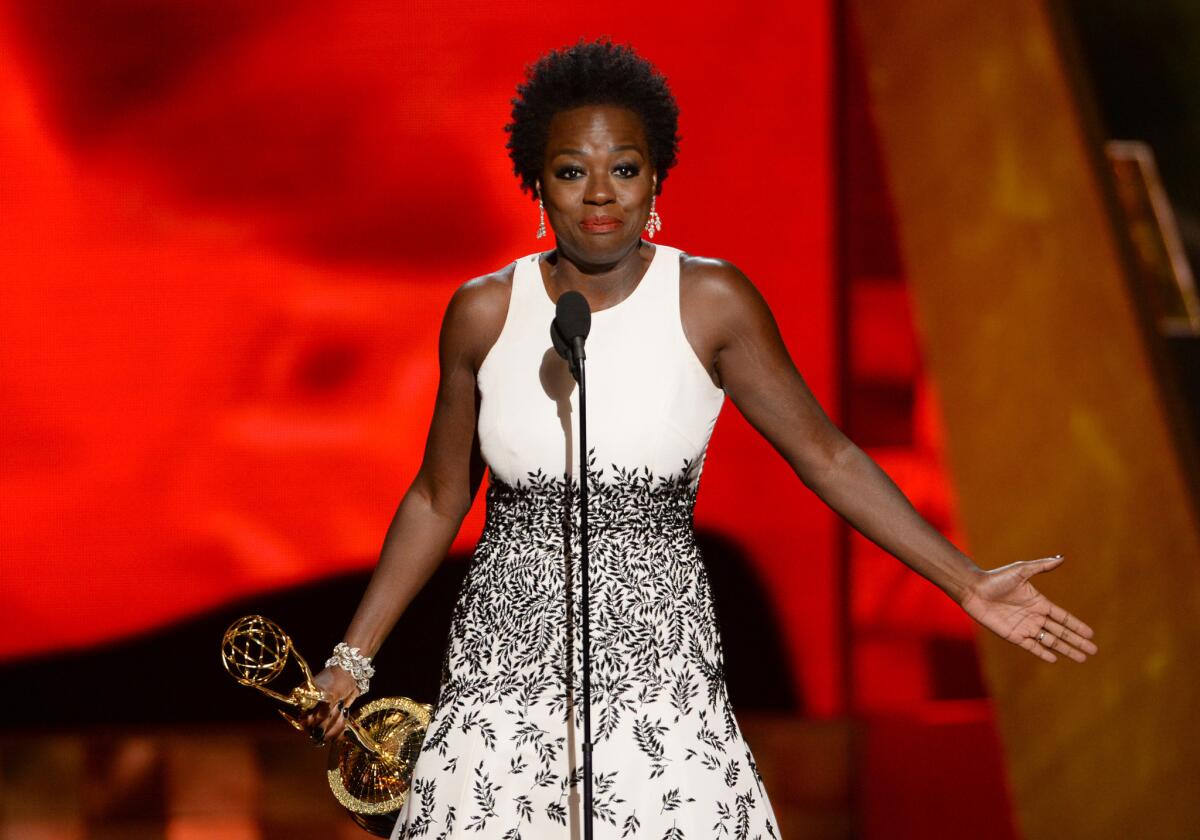Editorial: Viola Davis challenges Hollywood, but it is already responding?

Viola Davis accepts the award for outstanding lead actress in a drama series for “How to Get Away With Murder” at the 67th Primetime Emmy Awards on Sept. 20, at the Microsoft Theater in Los Angeles.
- Share via
When Viola Davis accepted her Emmy award Sunday night, becoming the first black woman to win for best actress in a television drama series, she delivered not just a speech but a pointed challenge. “The only thing that separates women of color from anyone else is opportunity,” she said, holding her statuette. “You cannot win an Emmy for roles that are simply not there.” Eloquently but firmly, Davis, an accomplished stage and film actress who has been nominated twice for an Oscar, threw down the gauntlet to the TV industry.
There is encouraging evidence that some Hollywood executives already have gotten the message. Two other black women won Emmys on Sunday for supporting acting roles, and among Davis’ competition for best actress in a drama series was Taraji P. Henson, the black actress who stars in the breakout TV hit “Empire.”
And those are hardly the only signs that television now has more opportunities for actors, writers and producers who are not white or not straight to tell stories rooted in different viewpoints. That’s not just a matter of executives taking risks on something unconventional; it’s also an indication that the audience is embracing a diverse array of shows and that the rapidly expanding platform for televised storytelling — broadcast TV, cable, Netflix, Amazon, Hulu — is enabling it. “Transparent” won its lead actor, Jeffrey Tambor, an Emmy for best actor in a comedy for his portrayal of a transgender person. The sitcom “black-ish,” about an upper-middle-class black family in a world that is only partially post-racial, was one of the first new shows last fall to be renewed for this coming season, and “Empire,” a melodrama set in the hip- hop music business, rocketed up the TV ratings this past season.
Still, it’s not clear whether this crop of shows is an aberration or a trend. That’s always difficult to tell in Hollywood, where decisions are based on advertiser support, track records and soothsaying. But we hope Hollywood decision makers will take Davis’ suggestion and see the value in hiring a diversity of talent across a production.
Even better is when Hollywood moves beyond casting based on color or gender, as producer Shonda Rhimes (who is black) has done in shows such as “Scandal,” which stars Kerry Washington as a powerful Washington fixer who happens to be black. The character in the Rhimes-produced “How to Get Away with Murder” that Davis just won her Emmy for is a brilliant, demanding, morally ambiguous law professor. That kind of role doesn’t need an actor of a particular race. It needs an actor of a particular talent.
Follow the Opinion section on Twitter @latimesopinion and Facebook
More to Read
A cure for the common opinion
Get thought-provoking perspectives with our weekly newsletter.
You may occasionally receive promotional content from the Los Angeles Times.









